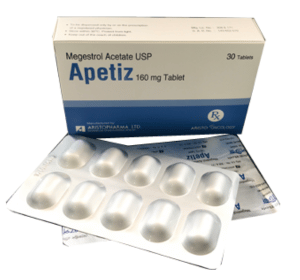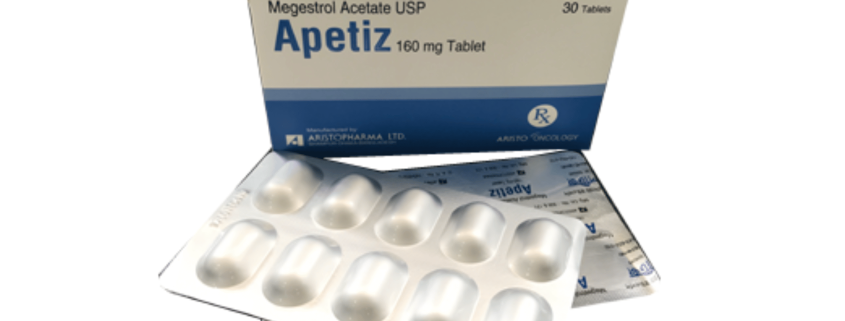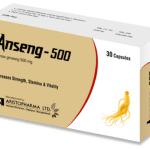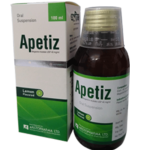Apetiz (Megestrol Acetate)

Therapeutic Group : Antineoplastic
Presentation:
Apetiz Tablet: Each film coated tablet contains Megestrol Acetate USP 160 mg.
Pharmacology:
The precise mechanism by which Megestrol Acetate produces effects in anorexia and cachexia is unknown at the present time. Absorption of Megestrol Acetate is well. Metabolism is primarily hepatic and the major route of drug elimination in humans is urine. After administration of 4 to 90 mg Megestrol Acetate in human, the urinary excretion within 10 days ranged from 56.5% to 78.4% (mean 66.4%) and fecal excretion ranged from 7.7% to 30.3% (mean 19.8%). The elimination half-life of Megestrol Acetate ranges from 20 to 50 hours.
Indications:
Apetiz is indicated for the treatment of anorexia, cachexia, or an unexplained significant weight loss in patients diagnosis with Acquired Immunodeficiency Syndrome (AIDS). Apetiz is also indicated for the palliative treatment of advanced carcinoma of the breast (i.e. recurrent, inoperable or metastatic diseases). It should not be used in lieu of currently accepted procedures such as surgery, radiation or chemotherapy.
Dosage & Administration:
Anorexia-cachexia syndrome: The recommended dose of Apetiz is 400 to 800 mg/day (10 to 20 ml/day) for at least two months and could be taken without regard to the meal.
Breast cancer: The recommended dose of Apetiz is 160 mg/day in single or divided doses. Shake the bottle well before use.
No serious unexpected side effects have resulted from studies involving Megestrol Acetate administered in dosages as high as 1600 mg/day for 6 months or more.
Contrainidications:
History of hypersensitivity to Megestrol Acetate or any component of the formulation and in case of known or suspected pregnancy.
Warning & Precautions:
History of thromboembolic disease. Monitor for signs/symptoms of adrenal insufficiency; consider empiric therapy if occurs. Diabetes, renal impairment, elderly, fetal toxicity, obtain (-) pregnancy test prior to initiation. Advise females of reproductive potential to use effective contraception during therapy and for nursing mothers\\\\\\\’ it is not recommended.
Side effects:
Some common adverse events which occurred in at least 5% of patients are diarrhea, impotence, rash, flatulence, hypertension, asthenia, insomnia, nausea, anemia, fever, decreased libido, dyspepsia, hyperglycemia, headache, pain, vomiting, pneumonia & urinary frequency. Some other adverse events also occurred in 1% to 3% of all patients are abdominal pain, chest pain, infection, moniliasis and sarcoma, cardiomyopathy and palpitation, constipation, dry mouth, hepatomegaly, increased salivation and oral moniliasis, leukopenia, increased LDH, edema & peripheral edema, paresthesia, confusion, convulsion, depression, neuropathy, hyperesthesia & abnormal thinking, dyspnea, cough,
pharyngitis & lung disorder, alopecia, herpes, pruritus, vesiculobullous rash, sweating and skin disorder, amblyopia, albuminuria, urinary incontinence, urinary tract infection and gynecomastia. A rarely encountered side effect of prolonged administration of Megestrol Acetate is urticaria.
Drug interaction:
Pharmacokinetic studies show that there is no significant alteration in pharmacokinetic parameters of Zidovudine or Rifabutin to warrant dosage
adjustment when Megestrol Acetate is administered with these drugs.
Use in special groups:
Use in Pregnancy & Lactation
No adequate animal teratology information is available at clinically relevant doses. Because of the potential for adverse effects on the newborn, nursing should be discontinued if Megestrol Acetate is required.
Use In Children & Adolescents (<18 Years Of Age)
Safety and effectiveness in pediatric patients have not been established. Megestrol Acetate is not recommended for use in children.
Geriatric Use (>65 Years Of Age)
In general, dose selection for an elderly patient should be cautious, usually starting at the low end of the dosing range.
Overdose
No serious unexpected side effects have resulted from studies involving Megestrol Acetate administered in dosages as high as 1600 mg/day for 6 months or more.
Storage:
Apetiz Tablet: Store within 30º C. Protect from light.
Packing:
Apetiz Tablet: Each box contains 10/30 tablets in alu-alu blister pack.



